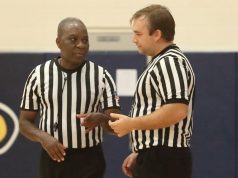Why do some officials perform poorly when under pressure? Ruling out poor positioning, misapplication or misunderstanding of the rules, inexperience and absentmindedness, one must turn to psychological explanations for official underperformance. Under highly stressful conditions, physiological and attentional changes can occur to cause performance to suffer. That performance deterioration can be attributed to a performance choke or a panic.
Whether an official panics or chokes may not matter much if the result is the same, but there are fundamental differences between the two conditions. Understanding their differences may prevent either one from occurring. A choke results from overthinking; a panic results from underthinking. Choking relies on thinking about what comes automatically; panicking relies on instinct. Choking involves rational thought; panicking involves abandoning rational thought altogether. Choking involves a progressive deterioration of performance; panic symptoms have a sudden onset.
The Choke
What makes the choke so painful is that it occurs in important situations involving skills that, under normal conditions, can be performed easily and to perfection. Choking is about failing to perform at the level dictated by the situation, despite having the capability, motivation and incentive to succeed. When it’s time to step up in “the big game,” that’s when we are most likely to choke.
Choking can occur for a number of reasons, but research in psychology suggests that performance problems due to choking occur in situations of high personal significance, under stressful conditions, and/or when fatigued. Those are powerful physiological and mental changes that can disrupt timing and sabotage mechanics.
Under those conditions, we tend to adopt maladaptive behaviors that direct our attention to the individual components necessary to perform a skill; the dreaded “paralysis by analysis.” The last thing an official wants to do in the waning seconds of a game is to overthink positioning, plan ahead a response to a coach or concentrate on how to efficiently execute an infraction. It’s just that type of overthinking that causes someone to choke.
Focusing too much attention on skills that are automatic is detrimental to skill execution. Psychologists call that explicit monitoring — attending to a skill’s step-by-step execution rather than relying on automatic processes. When we consciously monitor automatic movements, we interfere with the execution of those movements and become error prone.
We have engaged in deliberate practices of studying the rules and passing the tests, thus reaching our explicit goal of rules mastery. However, once we begin to act outside of our own awareness — such as when we apply those rules in competition — the act becomes implicit. That is, we no longer even notice how we apply the rules to the situation, we just do it. Situational variables like getting to the appropriate position, using the proper mechanics and communicating with a coach are done without awareness. Seasoned officials go through the motions almost without thinking about it because they’re encoded in the implicit memory.
Experienced basketball officials working in a crew of three automatically know their positions and can get there without planning or forethought. They’ve done it correctly all season without incident. But when fatigue and stress have set in, if an official begins to worry about where to go and how to get there, that conscious processing becomes a distraction and can interfere with performance. That’s when a simple skill that someone has spent a lifetime perfecting gets botched, setting the scene for a classic choke.
Panic
Panic is on the opposite end of the continuum from a choke. While choking involves over-thinking, panicking involves under-thinking. It involves relying on instinct. Instead of reverting to the mode of explicit processing in which movements become deliberate and less fluid, the panicked person’s mind goes blank. An official who has panicked may try to find the easy way out, do whatever it takes to “get out alive,” or self-destruct due to one simple mishap.
Subjectively, feelings of panic are characterized as a rush of apprehension, fear, terror or impending doom. While panic can be extremely subjective, it is usually characterized by physiological changes (elevated heart rate, dizziness, dry mouth, breathlessness), cognitive changes (inability to make decisions, lack of focus) and behavioral adjustments (avoiding upsetting situations or people, coping mechanisms). Thus, an official in the throes of panic may freeze when put on the spot, “forget” proper positioning, and/or avoid an angry coach.
An official in the throes of panic is devoid of any rational thinking. Unlike the choking official who is focusing on individual aspects of the officiating experience, the panicked official lacks the ability to focus on the game at all. Instead of staying in the game, thoughts turn to minimizing the stress. Panicking is more common for lesser experienced officials because they don’t have a residue of experience to draw upon.
Prevention
Since stress is one precursor for both outcomes, officials should train under stressful conditions. Attending camps in which one’s performance is evaluated, fixing a camera on an official and training in a physically challenging environment are good ways to simulate stress and decrease the likelihood of a choke or panic in the big game. If we can mimic stress during rehearsals, then we can better adapt to the stress when it counts.
Since the term “choke” is derived from increased tension in the neck and shoulder muscles, officials should monitor their muscle tension levels and use some type of relaxation technique to reduce tension. Deep breathing exercises followed by positive self-talk using phrases such as “I’m ready,” “I’ve got that” and “My mind is clear” should help the official remain focused on the game.
By reducing the physical feelings associated with excess tension, an official can reduce attentional distractions and improve concentration. Instead of focusing on the step-by-step skill execution (explicit monitoring), the official should focus on the desired outcome — for example, getting in position. Another way to discourage explicit monitoring is to allow officials to learn by doing. In that case, if new officials are given opportunities for “trial by fire,” they are less likely to focus on the individual steps required to perform and more likely to focus on the act of doing. Through repetition, practice and experience, officiating becomes automatic, thus it is done implicitly.
Finally, the best way to prevent a panic or choke from occurring is to get as much experience as possible. Officials should develop “pre-play routines” that can appropriately focus thoughts to avoid a choke. When an official feels scared and full of self-doubt rather than confident and in control, the stage is set for a panic. Self-confidence comes from past successes. When we have previously demonstrated mastery of an activity — even if it is in scrimmages — we feel more confident in competition. In short, success breeds success. And since novice officials are more likely to freeze in stressful situations, assigners should be especially careful to match up seasoned officials in games of high importance.
Sports are wrought with classic examples of choking, mainly because of their very public stage and because athletes are thought to have only one shot at their goal. While players have to rise to the occasion to perform in highly stressful performance situations, the officials must also be prepared to handle the stress of the situation. Whether an official chokes due to over-thinking or goes blank and panics, the result may be the same: a missed call, an improperly worded explanation to a coach, swallowing the whistle during a crucial play. Choking and panicking are self-defeating behaviors that are counterproductive to an official’s goals. But understanding the different characteristics and the different prevention techniques can help improve concentration and reduce the tendency to choke or panic in high pressure situations.
What's Your Call? Leave a Comment:
Note: This article is archival in nature. Rules, interpretations, mechanics, philosophies and other information may or may not be correct for the current year.
This article is the copyright of ©Referee Enterprises, Inc., and may not be republished in whole or in part online, in print or in any capacity without expressed written permission from Referee. The article is made available for educational use by individuals.
















